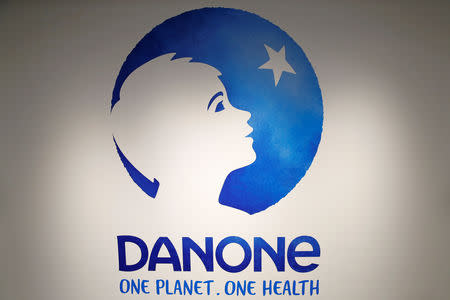Danone quarterly sales growth slows on weak China, Morocco boycott

By Dominique Vidalon
PARIS (Reuters) - Slacker demand for baby food in China and a consumer boycott in Morocco slowed third-quarter sales growth at Danone <DANO.PA>, although the French food group said it was sticking to its earnings growth targets.
Danone said it was banking on cost savings and a push into lucrative, healthy eating trends to meet those goals, despite lower sales of infant formula in China and the broad boycott in Morocco launched earlier this year on social media against what protesters said were unfair prices set by large companies.
Chief Financial Officer Cecile Cabanis cautioned the slowdown in China would last several quarters while the Moroccan boycott would weigh on the second half of the year.
Danone, the world's largest yoghurt maker with brands including Actimel and Activia, said third-quarter sales reached 6.186 billion euros (£5.4 billion), a like-for-like increase of 1.4 percent - slightly above analysts' forecasts for 1.2 percent growth.
Nevertheless, this marked a slowdown from 3.3 percent growth in the second quarter and 4.9 percent in the first quarter, and Danone shares fell 2.8 percent in early trading.
"The main miss is on Specialised Nutrition where infant milk formula is down 20 percent in China in Q3... We were not expecting such a drop" said Oddo analyst Pierre Tegner.
Danone, however, kept its annual financial targets.
Growth had accelerated at its dairy and plant-based business in North America, where Danone is integrating organic food group WhiteWave, and its European dairy division was on the road towards stabilisation, it said.
Danone, which is targeting an operating margin above 16 percent and like-for-like sales growth of 4-5 percent by 2020, reiterated its expectation for a double-digit rise in 2018 underlying earnings per share (EPS), excluding the impact of the sale of a stake in Japan's Yakult.
FALLING CHINA INFANT FORMULA SALES
Sales of Danone's 'Early Life Nutrition' products in China fell 20 percent in the third quarter following a period of strong growth and amid signs of changes in market dynamics.
The sales of the China-focused infant formula products had grown by around 30 percent in the second quarter of 2018 and by over 50 percent in the third-quarter 2017.
In China, where Danone competes in the baby food market with Nestle <NESN.S> and Reckitt Benckiser <RB.L>, there has been strong demand for baby formula products thanks to a sharp rise in birth rates tied to the end of China's one-child policy, and the emergence of new cities and an affluent middle class.
The peak in birth rates, however, happened in 2016 and started slowing down in late 2017, leading Danone to caution that the Chinese market will progressively show more normal trends from the second half of 2018 onwards.
Danone's indirect E-commerce infant formula sales had also benefited last year from China's decision to delay regulation of cross-border e-commerce, which led to stocking up by traders.
Cabanis said that although there were fewer births in China, Danone continued to benefit from demand for its ultra-premium infant formula products such as Nutrilon and Aptamil.
Morocco, which counts for 2 percent of group sales, was another weak spot as a result of the consumer boycott.
In September, Danone announced measures in Morocco to regain consumers' trust, including price cuts, but sales in Morocco were still down 35 percent in the third quarter.
(Reporting by Dominique Vidalon; Editing by Sudip Kar-Gupta and Emelia Sithole-Matarise)

 Yahoo Finance
Yahoo Finance 